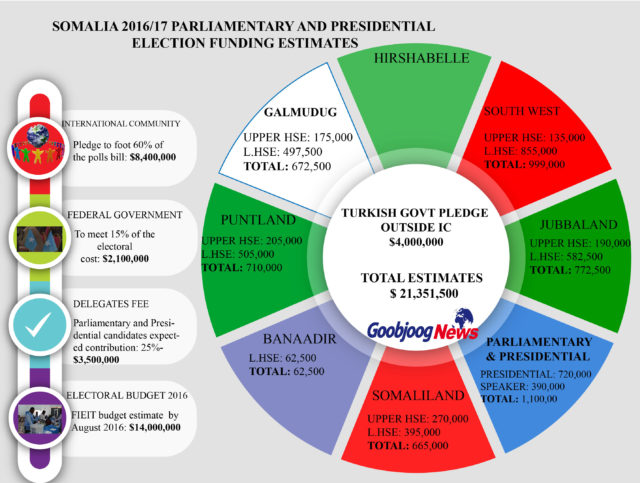SPECIAL REPORT: 2016/17 elections funds estimated at $21m


At least $20 million was raised from local and international sources for the 2016/2017 parliamentary and presidential elections in Somalia, surpassing the $14 million mark set by the Federal electoral body FIEIT, investigations by Goobjoog News reveal.
The international community pledged to foot 60% of the electoral bill while Somalia would meet the deficit. Out of the 40% for Somalia, the Federal Government was to contribute 15% which amounted to $2,100,000 while fees from candidates was projected to cover the balance which amounted to 3,500,000 or 25%.
Based on information obtained from the State Electoral Implementation Teams SIEITS) and sources close to the electoral process, delegates for both Lower and Upper House for all the six regional states and the Banaadiri community in Mogadishu contributed an average of $6, 871,500.
Presidential fee
Presidential candidates (24 in total) all paid $720,000 with each candidate depositing $30,000 to the Presidential Electoral Committee kitty managed by Parliament. Each candidate for the position of Speaker of the Lower and Upper House paid $15,000. Two candidates contested the race for the Upper House speaker parting with a total of $30,000.
The Lower House on the other hand attracted four candidates for the post of speaker with each required to part with same amount as the candidates for the Upper House speaker’s position.
The Senate had 14 candidates for the first and second deputy with each candidate required to pay $10,000.
In total therefore, candidates for speaker’s position and deputies all paid a total of $390,000.
Upper and Lower House seats
South West state which elected the highest number of lawmakers (69) to the Lower House and allocated eight seats for the Senate generated the most candidate’s fees. In total, candidates from South West state paid an average of $990,000.Second was Jubbaland which elected 43 members to the Lower and eight to the Senate. All candidates contesting for the Lower House contributed $772,000 to the FIEIT kitty.
The kitty was managed by the United Nations Development Programme and all candidates were required to deposit their fee to the UNDP account.
Puntland with 40 MPs and 11 senators paid $710,000 while candidates from Galmudug which had 36 slots for Lower House and 8 for senate came fourth having contributed $672,500.
Somaliland with 43 MPs and 11 senators came fifth with an average of $665,000 while candidates contesting for both Houses in HirShabelle paid electoral fees amounting to $640,000. Banaadiri community was allocated seven seats for the Lower House and none for Senate. All delegates from this community paid a total of $62,500.
Other Fees
Under the electoral guidelines released last year, only candidates contesting in any of the seats were eligible to file complaints. By late October, the Independent Dispute Resolution Mechanism reported 1,219 cases. For one file a complaint, he or she was required to pay a non-refundable fee of $1,000.
Based on these figures and given the IEDRM did not release any further information on the exact number of cases after October 27, 2016, a conservative figure of $1,219,000 in complaints fees would be arrived at. It is noteworthy that a number of cases arose during the elections after late October.
Turkish donation
The Turkish envoy to Somalia Olgan Bekar announced November 1, 2016 his government’s donation of $4 million to support the electoral process in Somalia. This figure was outside the amount under the International Community’s pledge.
In total therefore, Goobjoog News investigations estimate all actors in the electoral process generated a total of $21,371, 500 surpassing the $14,000,000 budget set by the FIEIT in 2016.
It is worth noting however the electoral process experienced several delays even after polling kicked off with some seats having to be subjected to second and third round voting because of irregularities.
Repeat elections involved logistical arrangements including security which was provided jointly by Amisom and Somali security forces.
Delegates allowance
Each delegate was entitled to an average $400 facilitation fee which covered food, transport and accommodation. Depending on the regions, the delegates each delegate would get between $200 and $600. In total therefore, delegates would gobble up an estimated $5,610,000. This is based on the number of delegates which were 14,025 delegates participated in the election of members of the Lower House.
The Federal Indirect Electoral Implementation Team (FIEIT) which was in charge of the elections did not comment on requests from Goobjoog News but indicated it was compiling a report on the elections to be made public soon.